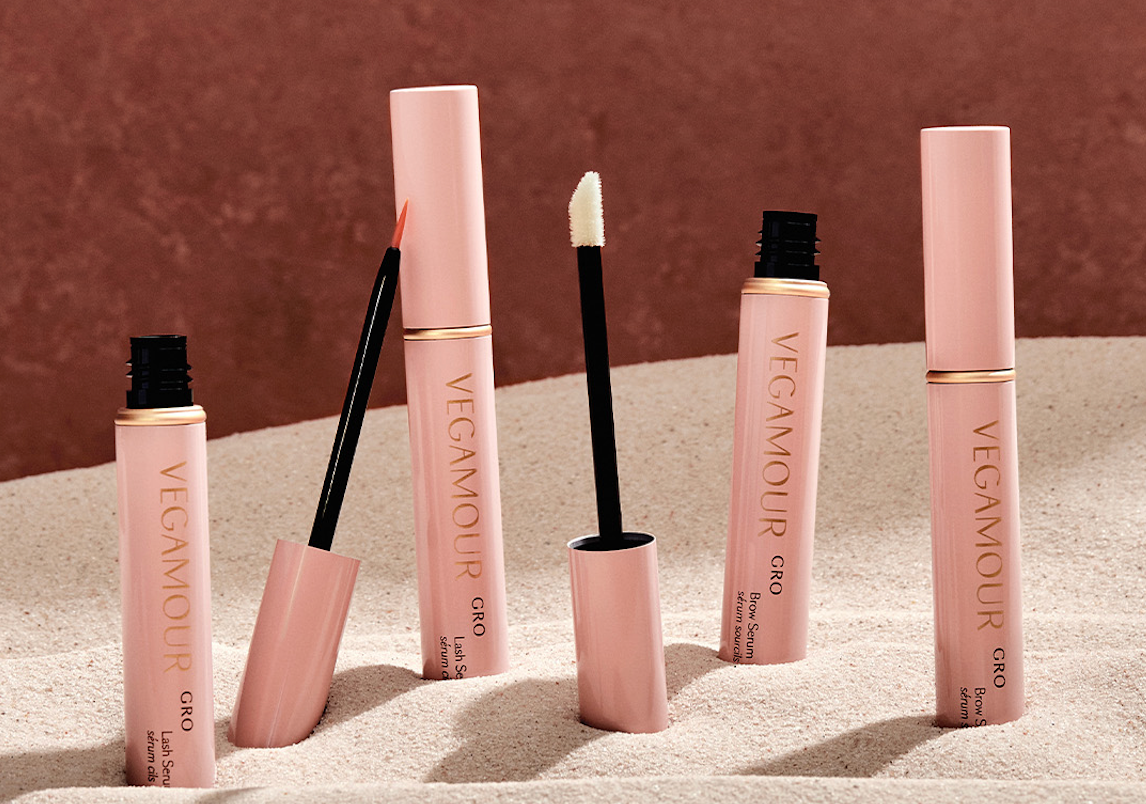A trifecta of popular powerhouse ingredients — Vitamin C, retinol and peptides — have become all the buzz in skincare over the past decade. There's even research to suggest they may have significant anti-aging effects. So, can these actives go beyond the scope of your skin and also be of benefit for your hair? When it comes to certain peptides, the answer just might be yes.
If you’ve been noticing increased hair shedding, hair thinning or even sparseness in your brows and lashes, read on! Hair products with peptides could be the added boost your hair — and scalp — needs to stimulate blood flow and support healthy hair growth. Here, expert advice on how peptides can potentially help your locks grow, plus info on the best peptide-powered products to add to your routine to get thicker, fuller looking hair.
#include-related-slider#
What Are Peptides?
"Peptides are amino acids that are the building blocks of certain proteins needed by the skin, like collagen and elastine. More specifically, collagen is made of three polypeptide chains, so adding peptides can stimulate your skin to make collagen. More collagen can lead to firmer, younger-looking skin, "said Ramy Gafni of Ramy Cosmetics. "For hair, copper peptides are purported to help hair growth. Although there aren’t conclusive studies, so the jury is still out. Peptides are the building blocks for collagen though, so this can help hair as well as skin."
As compounds composed of amino acids bound together by a ‘peptide’ bond, think of peptides as the building blocks of essentials such as protein and collagen. While amino acids are comprised of the same kind of compound that proteins are made of, there is a key difference between the two: Peptides are smaller in size.
The name of a peptide corresponds to its size. For example, a dipeptide has two amino acids, a tripeptide has three amino acids and so on.
Shop: The Best Products for Thicker, Fuller Looking Hair
How Peptides Work
Peptides are most often formed when protein breaks down. Peptides act like little messengers that signal different things in the body and trigger various important mechanisms.
How they behave and what they signal depends on the kinds of amino acids they are made up of, thus the term “peptide” actually refers to an incredibly broad category of compounds. Within the body they can trigger muscle development and anti-inflammatory responses.
Peptides occur naturally in nearly every tissue of the human body. Peptides can also be found in a variety of foods, including fermented foods. These include:
- Tofu or soy
- Pickled vegetables
- Kimchi
- Kombucha
- Oats
- Flaxseed
- Lentils and beans
Read: 6 Foods That May Block DHT and Combat Thinning Hair
The Power of Peptides for Hair
You've likely seen — or maybe even used — peptides in skincare serums. Peptides are used in skincare for their healing properties, as protective skin barrier proteins with anti inflammatory properties, minimizing free radical damage. So, how exactly does this translate to your hair?
Peptides are used to fight inflammation — which when it occurs in the scalp can impact the growth phase of your hair, which is known as the anagen phase. This autoimmune reaction of inflammation in the scalp may enlarge hair follicle size, impacting the various cycles of hair growth.
Other stages in the hair growth cycle include:
- Catagen, the transition phase.
- Telogen, the resting phase.
- Exogen, the shedding phase.
Androgenetic alopecia, also known as male pattern baldness, is one common type of hair loss. Female hair loss can also be related to this condition; however, when the hair thins in women, it's typically more noticeable from where the hair parts, rather than from the hairline as seen in men.
When used as a topical treatment, peptide powered products may boost the healing process by acting as cell-signaling agents, supporting the protein production that is influential in growing hair. They can also help reduce inflammation and irritation in the scalp that can be harmful to healthy hair growth.
Using a specific copper peptide may help increase blood circulation, according to some research. The element copper may help maintain tissues found in blood vessels, which potentially means that copper peptides prolong new hair growth by stimulating hair follicles to receive adequate oxygen.
Another helpful tip to potentially increase hair growth is to stimulate circulation in the scalp to boost new blood vessels and fight inflammation. Try a handheld scalp massager to treat yourself to a soothing scalp massage at the end of a long day.
Proven Peptide: Oligopeptide-2
Let's talk peptide power. Oligopeptide-2, which is also known as insulin-like growth factor-1 or IGF-1, may be of benefit to your hair. Normally, the human body produces IGF-1 on its own, as it has a variety of functions within the human body.
One of its functions is promoting hair growth, by acting as a cell-signaling agent that affects the hair follicles. If you’re experiencing hormonal hair loss and find that the typical solution of applying DHT-blockers doesn’t work, it can be a sign that the real issue is lack of natural IGF-1. This is when a topical treatment of oligopeptide-2 may help. Research supports that when formulated in a way that can penetrate the skin of the scalp, this peptide has been shown to increase hair density.
Consider adding a hair serum into your daily self-care routine. RO Hair Serum includes oligopeptide-2, as well as turmeric (curcuma longa). Research has shown Curcuma longa can increase IGF-1 delivery to the dermal papillae. Apply either serum topically along the hairline daily for best results in as soon as 90 days.
Learn: Should You Choose GRO or GRO+ Advanced?
Proven Peptide: Acetyl Tetrapetide-3
Next up is acetyl tetrapetide-3, which plays a starring role in supporting hair follicles and aiding with hair retention. Acetyl tetrapetide-3 is based on the signal peptide that acts as one of the building blocks of the proteins like collagen and fibrin which makes up the extracellular matrix (i.e. ECM), which is the connective network that supports cells. It’s a peptide that the body normally secretes to aid in tissue regeneration and wound healing; it is also highly beneficial for the hair follicles.
When applied topically, acetyl tetrapeptide-3 stimulates type III and type VII collagen and laminins, which maintains the ECM to support hair growth. In other words, it turns the hair follicles into better anchors by strengthening the protein-based matrix that surrounds them. This is especially important for the brows and lashes where even a little bit of hair loss can be very noticeable.
Acetyl tetrapeptide-3 also helps to support the hair follicles so they are in a healthier position to hold on to and retain hair. This peptide alone likely won’t have a major impact on pattern hair loss, but it can absolutely help with hair loss caused by trauma or follicle inflammation. It is thought to be most effective when used in combination with the DHT-inhibitor red clover extract, which may help encourage an increase in hair growth.
#include-related-slider#
Peptide Powered Products
"I recommend products such as a a supplement that helps your hair, skin and nails by providing the proteins needed to produce collagen. I suggest looking for peptides in products like moisturizers or serums as opposed to cleansers, because they stays on your skin long enough for the peptides to be effective, as opposed to a cleanser, which is rinsed off. While peptides have become a key ingredient we see marketed on hair and skincare products, they can help only when used properly, like in a leave-in hair product. They are not so helpful in a cleanser or shampoo that are rinsed out immediately," said Gafni. Peptides are more helpful when ingested through a supplement or proper diet."
If you're looking for a supplement to add to your daily diet, consider GRO Biotin Gummies for Hair, which feature nutrients such as:
- Folic acid
- Vitamins B-5 and -12
- 16,666% of your daily value of biotin, or 5000 mcg
- Vitamins A
- Vitamin C
- Vitamin E
These nutritional powerhouses can stimulate new cell generation and keratin production, which will encourage healthier, stronger hair. They also work to neutralize follicle-damaging free radicals and zinc to help promote and maintain scalp health. Take one strawberry-flavored biotin gummy vitamin a day for fuller-looking, radiant hair.
Peptides Are Great for Lash & Brows, Too
Peptide powered products may be the building blocks your locks are looking for whether it's your hair, lashes or brows that you're trying to fill out. Bolster your brows and amplify your lashes with GRO Lash Serum and GRO Brow Serum. Both contain acetyl tetrapeptide-3 with its ability to anchor precious hairs in place.
Elevate your hair, lash and brows with the power of peptides — and, adopt an approach that integrates self-care strategies to address your holistic health from tress to toe!
Additional members of Team VEGAMOUR contributed to the reporting for this article.
More From VEGAMOUR
- Shop: The Best Products for Thinning Hair
- Is Shampoo Bad for Hair? Here's What to Know
- Does Pumpkin Seed Oil Help With Hair Loss?
- How to Grow (or Regrow) Your Eyelashes
- Shop VEGAMOUR Best Sellers






















